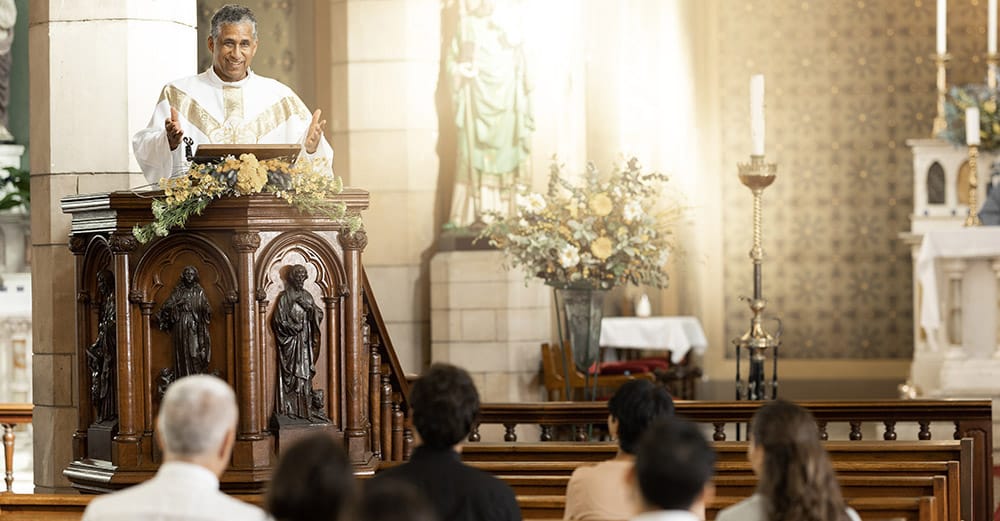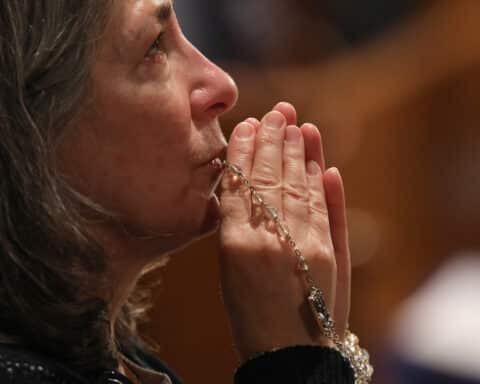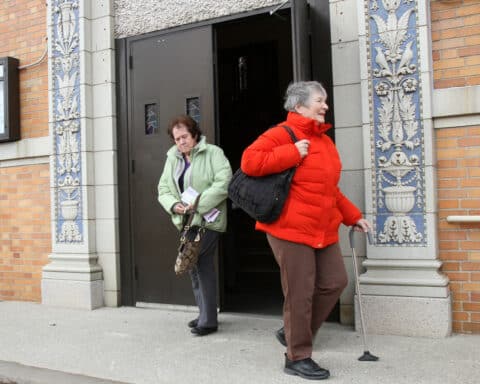“Please, the homilies: They are a disaster,” Pope Francis implored this January. Speaking to a gathering of diocesan liturgical directors, the pope begged for homilies to last no more than 10 minutes. The homily is not an academic “conference,” the pope said. Homilies should include, according to Pope Francis, “an image, a sentiment” for people to take home.
The pope has made similar remarks about the quality of Catholic preaching before. In January 2021 he said, “Even many homilies — I say it with respect but with pain — are abstract, and instead of awakening the soul, they put it to sleep.” On another occasion the pope said, “The homily must be prepared well; it must be brief, short!”
In fact, the pope very formally addressed the shape and scope of preaching early on in his pontificate in his apostolic exhortation Evangelii Gaudium. “The homily is the touchstone for judging a pastor’s closeness and ability to communicate to his people,” Pope Francis said. “We know that the faithful attach great importance to it, and that both they and their ordained ministers suffer because of homilies: the laity from having to listen to them and the clergy from having to preach them!” Clearly Pope Francis is seriously concerned about the quality and impact of Catholic preaching.
Others, too, have taken notice. Lilly Endowment, which funds a wide variety of religious causes across America, has launched the Compelling Preaching Initiative. The project hopes to provide tools and resources to preachers to equip them “to proclaim the Gospel to a variety of audiences in more engaging and effective ways.” The fund awarded America Media a $1 million grant to develop a mobile phone app that will compile a number of preaching resources to help priests and deacons prepare homilies.
Similarly, the McGrath Institute at the University of Notre Dame received a $1 million grant from Lilly Endowment to develop a three-year program centered on a “team-based cohort approach.” The institute’s goal will be to connect pastors with academic resources to enrich preaching.
“The homily is not a trite discourse — nor a catechesis like the one I am giving now — nor is it a conference nor a lesson,” Pope Francis said. Good preaching is essential because it is the dialogue between a priest and his people. In the homily, a pastor invites his hearers into a conversation with and about God. It is the homily that has the power to stir up personal faith, to encourage sacramental practice, to give sound instruction and to encourage evangelization. The Sunday homily in particular can fuel the faithful, giving a taste of the Holy Spirit to season the day in and day out with the flavor of faith.
It’s true that some priests are not gifted preachers, as not all people are gifted public speakers. Some cannot or will not cultivate rhetorical techniques or other public speaking skills. Others suffer from nervousness, even after having preached for years. Some priests are not native English speakers and struggle expressing themselves and their faith in a language not fully their own.
But too often, Catholics use a poorly delivered or ill-constructed homily as an excuse to disengage from Mass. The Sunday homily is not only about the priest or deacon delivering it. There are things that Catholics in the pews can do to get the most out of any homily, good or bad.
So if you’re not the one giving the homily, how do you become more disposed to get more out of it? Here are some suggestions:
First, fight incipient minimalism that stems from parishioners treating Sunday Mass as a mere obligation. Arrive early to Mass to get focused, gathering yourself and being ready for the Sunday celebration. In fact, come prepared by having read the readings ahead of time. Start a week ahead, meditating each day on the upcoming Sunday readings.
Pay attention to the readings by following along in print as the words are proclaimed. Buy your own missal, and mark the pages so that you can easily open it at the proper time.
Practice active listening. Make eye contact with the preacher and nod at points you find agreeable instead of letting your eyes wander — or, worse, closing them. Get a notebook and take notes on what you hear or think, and use your notes for prayer during the week.
Find one key point to take away from the homily, then talk about it, reflect on it and, perhaps, discuss it in the car on the way home. Extend charity to priests to encourage them in their ministry. If you are hesitant to develop a relationship with your parish priest, he may be less able to offer a healing balm during his preaching. Above all, pray for the preacher.
Ultimately, preaching is a grace. The Holy Spirit will illuminate the minds and hearts of hearers according to his designs. But both the nature of the preacher and the nature of the hearer can be better prepared to receive that grace. There are many steps that can be taken to get the most out of homilies, not only on the part of priests and deacons who preach, but on the part of those in the pews as well.
Our Sunday Visitor Editorial Board: Father Patrick Briscoe, Gretchen R. Crowe, Scott P. Richert, Scott Warden, York Young





